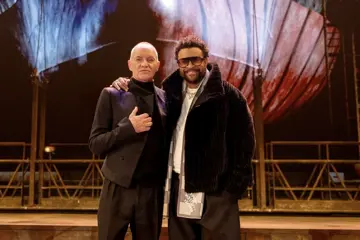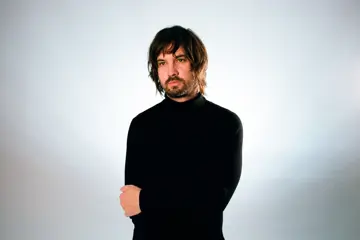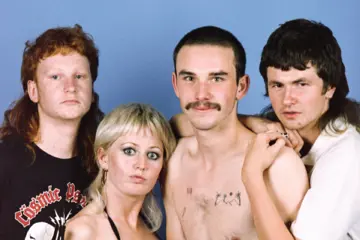 Sullivan
SullivanThe Victorian Music Development Office (VMDO) recently partnered with the Interactive Festival Forum (iFF) to deliver a virtual Victorian delegation, supporting thirty live music professionals to attend the online conference. The conference usually takes place in London each September (as the International Festival Forum) and this year, the conference presented a one off two-day live stream event, bringing together 650 delegates from all over the world. Artist, producer and booking agent Sullivan Patten recaps their experience about what it’s like to attend a virtual conference in 2020.
On September 2nd and 3rd, the International Festival Forum (iFF) 2020 was delivered online for the first time as the conference, like most other physical events of 2020, fell casualty to COVID-19. I was generously invited by VMDO to attend as a delegate and to share my experience of the event as a live industry professional. Sure, a trip to autumnal London would have been lovely, but one benefit of events moving online is the greater accessibility for international attendees to engage, network and learn from the conference - at little to no cost.
The conference offered a welcome space to come together as we collectively navigate the abrupt deactivation of the industry and learn to accept the inevitable; settling in for rest and recalibration. An opportunity for festival stakeholders, whose events have been in a holding pattern for six months, to discuss challenges, learnings and ideas, and envision ways to eventually restart with a renewed unified optimistic energy for the overall improvement of the industry.
The event was held in BST, meaning an early evening start for us tuning in from Naarm/Melbourne, and ran into the early hours of the following morning. This meant my body (which has been in strict state-mandated lockdowns for eight weeks now) needed to adjust to staying alert past 9pm. For this reason, I missed a lot of the live sessions, but iFF offered recordings of the sessions for a week post-event which was welcome news to those of us that have adopted geriatric bedtime attitudes since lockdown!
Don't miss a beat with our FREE daily newsletter
Panel topics ranged from insurance, navigating Force Majeure, artists development in a lost year, virtual events and VR, survival stories of the independent sector, sustainability and included a keynote from ex-WME super agent Marc Geiger.
The platform was relatively user friendly and mirrored an IRL experience of a conference surprisingly well. The chat function to engage with speakers and other delegates throughout each panel was a great forum to brainstorm ideas and offer questions to the panels while being able to jump back in to refer to after their conclusion. It also offered in-session polls relating to panel topics, the results of which were often very surprising.
Agency showcases were included on both days presenting a selection of artists on label rosters, all of which were creatively presented and edited, with artists seemingly self-filming their performances in their own capacities throughout lockdown. These recorded showcases were particularly fun to watch back, and the ability to skip through artists that I didn’t vibe was a real plus - one feature I wish I could bring with me into the real world! It made me genuinely miss seeing live music, but at the same time, it made me feel excited to discover new artists and watch their creativity shine despite the challenging and peculiar circumstances. Shoutouts to Remi Wolf, Amahla, Blu DeTiger and Lynks Afrikka.
Throughout the panels and keynotes I attended, there seemed to be a pattern and key takeaway of wanting to unite as an international industry - as agents, management, labels, fans, promoters and venues - in order to show resilience and strength to governments that the sector is professional and prepared to re-emerge from the pandemic in a safe, well-informed way. I found the parallel made between the 2015 attack at the Bataclan in Paris and COVID-19 during the New Threat, New Risks panel really interesting, in terms of the effect on the collective industry and the demonstrated evidence in being able to “safely rebuild” from a catastrophic event.
The presenting panellists were thoughtful and engaging, contributing valuable insight into their thinking and actions over the past six months and also strategies moving into 2021and beyond. I particularly enjoyed listening to Roberta Medina from Rock In Rio Festival discussing the roadmap on reopening festivals on The Big Rebuild - Festivals Bounce Back panel, and her supreme confidence that her festival will return, as normal in 2021.
Fra Soler (Primavera Sound) and the operations team from Roskilde Festival expressed less confidence, citing that creating a socially-distanced, “COVID-safe” alternative presentation to their festivals would undermine the creative vision of their festivals, and not align with their brand, which at the end of the day was more valuable to them. This is a complicated and common feeling amongst many I met with and saw on panels over the two days, and mirror the same conversations I am having with industry peers back in Australia.
Speed meetings can always feel a little awkward, and the online version was intimidating at first due to not speaking to a stranger in a long time, let alone via video chat. The iFF speed meetings algorithmically connected you with other delegates and were super fun and valuable, and by the end, I felt like the five-minute cap was too short. I was able to capitalise off these plutonic blind dates and exchange contacts with multiple bookers and promoters from across Europe and the UK.
One of the most valuable panels was Sustainability Beyond 2020 which highlighted key issues regarding the effects of COVID-19, positive and negative, on the environment. The panellists, Holger Schmidt from Go Group and Claire O’Neill from A Greener Festival, noted that although there were some benefits to aid the slowing of climate change, that as a whole COVID-safe measures were regressing the progress of sustainability measures. There has been a mammoth increase in single-use plastic particularly from PPE, less people on public transport - and more people in cars - and a huge increase in IT costs and internet usage, both which are huge global polluters. This was a complicated conundrum and one that can’t be ignored once the live industry picks back up again. The panel had an overwhelming response from attendees in the post-session poll agreeing that sustainability was an issue that cannot be ignored and that the industry as a whole should commit to more sustainable practices from the get-go once events open back up.
The final panel, This Is Why We Do It, wrapped things up with shared optimism, and a collective reminder via various industry tales and anecdotes to remind attendees that despite the current harsh adversity, there is a reason we do this work…. and once we come out the other side, that we’ll get to enjoy the second “roaring '20s” as Marc Geiger so eloquently put it.
I’ve thought a lot about the conversations and panels over the past few days and interrogated some deep thinking about where we are now, where we are going, how we will get there, and what we do when we arrive. How can we keep people safe, while committing to our creative values and aligning with our brands? Does it make sense, from an artist career-trajectory point of view, to cut and paste line-ups from 2020 to 2021? How can we maintain sustainability momentum and progress, and counter the backwards effects caused by COVID-safe measures? The iFF didn’t answer any of the big questions we all have, it wasn’t the vaccine we are all scrambling for, but it certainly did help.
Connection and communication is so important in these times of distance, chaos and uncertainty, personally and professionally. The value I found in being able to continue the conversations, ask the questions, and share the load with my industry peers was paramount. I would strongly recommend attending opportunities like this in future and to not be turned off by the virtual aspect, as the benefits far outweigh the cons and all without the hangover!
Find out more about Sullivan and their work below. Head here to find out more about VMDO and here for iFF.



















